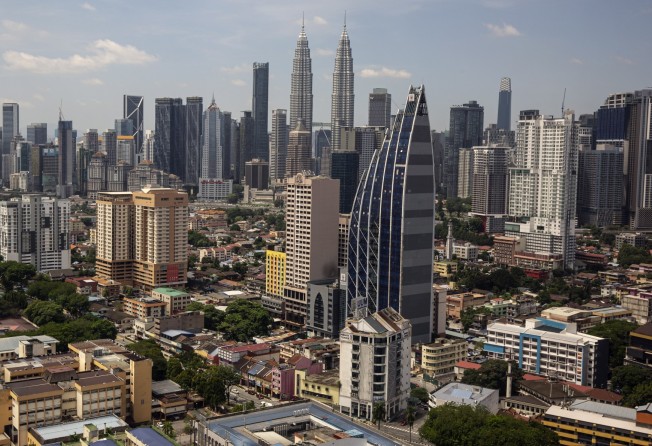
Malaysia’s Mahathir: NEP has created more graduates, but bumiputras still ‘lack business skills’
- The former PM played a key role in the formation of the 1971 policy that benefits the majority Malay and native population
- In this interview, he reflects on the programme’s early days, its flaws and successes, as well as the outlook for young Malays amid a Covid-hit economy

Malaysia’s elder statesman Mahathir Mohamad recently spoke to This Week in Asia on the New Economic Policy (NEP), the 50-year-old affirmative action programme that benefits the country’s majority Malays and aboriginal groups, known as “bumiputras” (sons of the soil).
The 96-year-old politician twice served as Malaysia’s prime minister, including a stint from 1981 to 2003, during which the NEP was broadly expanded.
Mahathir backed the continuation of the NEP, also known as the bumiputra policy, during his 2018-2020 premiership under the aegis of the reform-minded, multiracial Pakatan Harapan alliance.
First promulgated in 1971 by Mahathir’s political mentor Abdul Razak Hussein, the NEP envisioned the target groups would control 30 per cent of corporate equity by 1990.
Observers say Mahathir’s advocacy played a key role in the policy’s birth. In 1970, following bloody racial riots between ethnic Malays and Chinese, he wrote the book The Malay Dilemma, which argued that the majority group needed state aid to ensure they would not become subservient to minorities in their own homeland.

Currently the country’s bumiputra community controls 17.2 per cent of corporate equity compared to 25.5 per cent in the hands of minority groups, and the NEP remains in place in various forms.
Mahathir’s support of the NEP is interlaced with a personal belief that Malays may have innate deficiency in business acumen – an attribute he believes is a key reason the 30 per cent corporate equity target has not been met.
Below is an edited transcript of highlights from the interview. Some sections have been edited for clarity.

Why was the NEP enacted and what role did you play in its conception?
After independence, the situation of the Malays did not change for the better. That was probably the cause of the 1969 riots. So the government of Prime Minister Tun Abdul Razak Hussein decided something had to be done. He conceived the “New Economic Policy” … so as to help Malays catch up with non-Malays. How it was to be done, of course, was not detailed at the time, and in fact they did not really know what was needed to help Malays catch up.
Tun Razak had been reading a lot at the time. My book, The Malay Dilemma, came out in 1970, and I discussed a lot about the situation of the Malays. I believe some people may have read the book and decided that there are ways to help the Malays catch up with non-Malays. But actual action was not really spelt out.
What were the key problems during the early days of the NEP?
The Malays, generally, want to get rich quick. So the easy way was of course to sell the contracts [that they received under the NEP]. The only people who could buy from them were ethnic-Chinese contractors. They had the capacity to implement whatever contracts were being given out.
The unfortunate thing was, from the proceeds of the sale, the Malays should have used that as capital and go into business, learn about the business. Instead they found it easier just to get the contracts. So they sold one contract, and then hoped to get another.
When you became prime minister in 1981, what steps did you take to correct the flaws in the NEP?
We tried to identify some projects, especially for the lowest grade of [government contracts] and we gave them to the bumiputras. Unfortunately, the same thing happened. They sold the contract to other bumiputras. In the end, the bumiputras found they had paid so much to get a contract they couldn’t make any profit.
For example, building computer labs is very easy. Anybody can do that, but the Malays still did not have much expertise for that. They didn’t learn how to do it themselves; they sold the contracts. In the end, when the margin that they could make was almost nil, the contractors who eventually did the projects started using poor-quality material, resulting in some of the labs collapsing.
The problem is also with the Malay attitude. They have to change. It is not just about making profits. They have to manage their wealth. I noticed that Malays are very bad at bookkeeping, they don’t have proper record keeping. For example, the paddy farmers never know how much money is spent to produce the paddy, and then they think whatever they produce is their profit. So this is a problem, lack of understanding of the basics of business.
What would you regard as a success for the NEP?
In terms of education, we were very successful because we sent a lot of Malays for studies. They even got their doctorates. They are very good when it comes to studying and many of them have become professionals now. In that area, the NEP was successful.
But in the attempt to introduce business to the Malays, there were some successes, but not enough to help them catch up with the non-Malays. The non-Malays are already ahead of them. Growth for the non-Malays, even a small growth, is a percentage of a big base. For the Malays, the base here [in 1971] initially was only 2 per cent of the wealth of the country. So, a 10 per cent increase will amount to a 0.2 per cent increase. Whereas a 10 per cent increase for the non-Malays with their 30 per cent base … amounts to 3 per cent.

What do you envision the future for the Malay population to be?
The young Malays have a future. Some of them have gone into the new technologies, they are good at programming, IT and all that. So they have gone into business, partly because of the pandemic.
There were no government opportunities, no government jobs for them. They had to be on their own and some of them were quite successful. [As for the Malay politicians], they are so insecure that all the time, they are thinking about how to stay in their place, to remain in the government. The legislative majority is so small that at any time, the government can be brought down.
The people in power are not thinking about how to develop the country or to promote the economy. Of course, at the same time, they have taken over the government during a very bad period, because of Covid-19, so the problem caused by this pandemic is difficult to handle and requires money. Right now, they are struggling to tackle the problem caused by the crisis.
I think Malaysia has potential. This country is very rich in resources … but it is ultimately up to the people. If they take bribes and vote for corrupt people, then the country will go to the dogs – very simple.